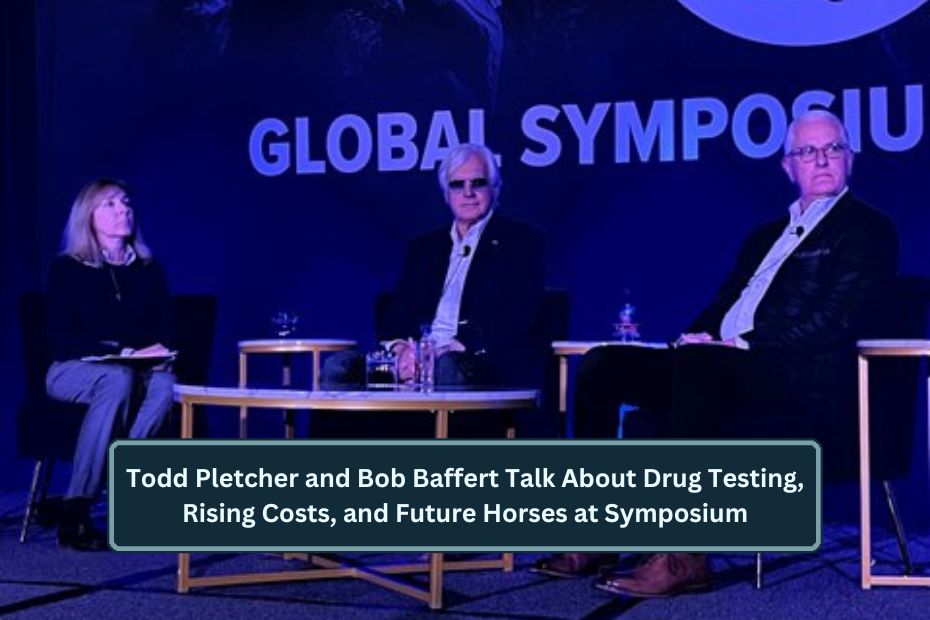At the 2024 Global Symposium on Racing, held in Tucson, Arizona, two of the most successful trainers in horse racing—Todd Pletcher and Bob Baffert—returned to share their experiences and discuss their careers. This session, titled “Champions. Challenges. Commitment. A Conversation with Bob Baffert and Todd Pletcher,” provided insights into their recent achievements, setbacks, and the challenges they face in the industry today. Both trainers, who are Hall of Fame members, discussed a wide range of topics, including equine drug testing, rising costs in training, and new racing regulations.
Pletcher Talks About Drug Testing and Rising Costs
Todd Pletcher, who was awarded the University of Arizona’s Alumnus of the Year Award during the event, discussed some of the difficult challenges he has faced in recent years. One topic of concern was the issue of contamination in equine drug testing. Pletcher addressed the controversy surrounding Forte, one of his top horses, who tested positive for meloxicam, a non-steroidal anti-inflammatory drug, following the 2022 Hopeful Stakes at Saratoga. This led to sanctions against Pletcher and legal challenges, with the possibility of Forte being disqualified from the race.
Pletcher also spoke about the increasing costs of training horses, mentioning the rise in minimum wages, work visa costs, and the added expenses due to new regulations. He expressed concern that these rising costs might drive people away from the sport. “People are just going to say, ‘You know what—it’s too expensive to participate,'” Pletcher said. His words reflect the financial pressures that many trainers and owners are facing in the industry today.
Baffert Discusses Career Setbacks and Future Horses
Bob Baffert, another Hall of Fame trainer, also shared his experiences at the symposium. Baffert is known for his many accomplishments, but he has also faced significant challenges, especially following the disqualification of his horse Medina Spirit in the 2021 Kentucky Derby due to a drug infraction. Baffert was suspended for 45 days by the Kentucky Horse Racing Commission and banned from Churchill Downs tracks for three years. However, this ban was recently lifted, allowing him to participate in races again.
Baffert’s focus is now on preparing for future races, including the Kentucky Derby. He has several exciting 2-year-old prospects, such as Citizen Bull and Gaming, who finished 1-2 in the Breeders’ Cup Juvenile. Baffert remains optimistic about the future and continues to work with some of the sport’s most promising young horses.
The Future of Racing: New Ideas for Growth
The symposium also featured panels discussing the future of horse racing. One panel, titled “Investing in Racing’s Future: Perspectives From the Next Generation,” focused on ideas to improve the sport, especially in terms of safety and growth. The HISA (Horseracing Integrity and Safety Authority) Next Generation Advisory Group presented several innovative ideas, such as revamping television broadcasts with more relatable graphics, incentivizing early betting, and embracing social media influencers to attract a younger audience.
Another panel, “Fifty Ideas in 50 Minutes,” shared ideas for improving the industry quickly. Among the suggestions were displaying odds in decimal form instead of fractions and putting the Eclipse Award presentations on the road to reach more fans.
Conclusion
As Todd Pletcher and Bob Baffert continue to shape the future of racing, they are also working to overcome challenges within the industry. From dealing with drug testing issues to managing the rising costs of training, both trainers have faced obstacles that require careful navigation. At the same time, new ideas and innovations from the younger generation of racing professionals bring hope for growth and improvement. As we look ahead, the future of horse racing appears to be filled with exciting opportunities and challenges for both trainers and fans alike.
Visit Home

